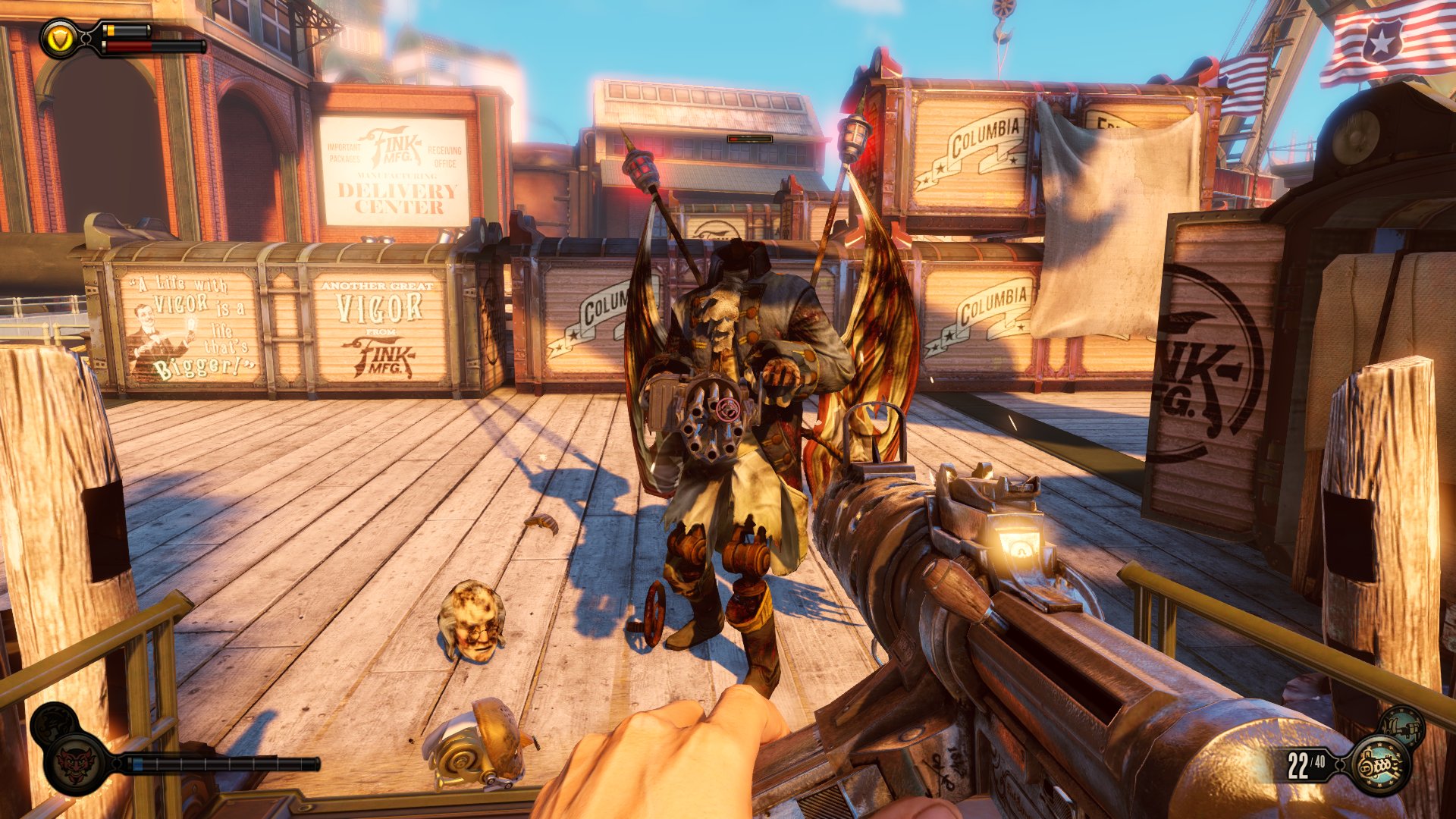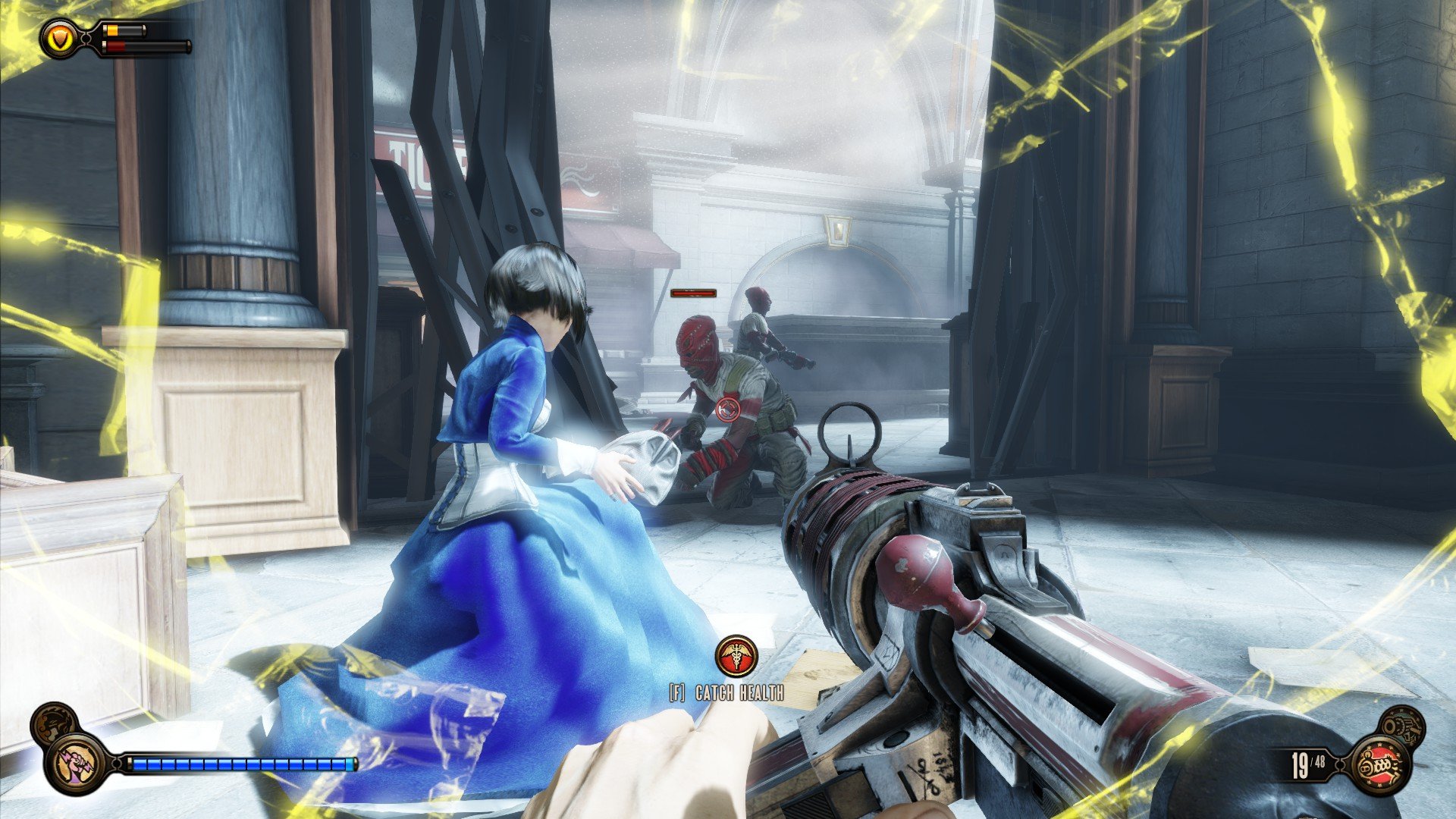BioShock Infinite Review
Infinite is not as cohesive as its predecessors, but it presents a complex narrative and proficient combat
BioShock Infinite is an unfulfilling action game with a layered story, brilliant art design and adequate shooting mechanics. It is the third game in an exceptional series known for atmosphere and narrative. Infinite dares to move the franchise away from the iconic underwater city of Rapture. It trades the waterlogged vistas for a mysterious city nestled deep within the clouds. The suspended city of Columbia is home to mechanical juggernauts, firebombing zeppelins and racist characters. Elizabeth, the most important character in Columbia, follows the player and helps them during combat. She becomes the major focal point of a confusing story and an overwhelming ending.

The introduction to Columbia is nothing short of spectacular
You take the role of Booker DeWitt, a failed gambler and war veteran, during the early years of the 20th century. The game begins on a rowboat heading for a lighthouse. This lighthouse is a conduit to the aerial city of Columbia. Booker must explore the city and find Elizabeth. She is the key to paying off his debts. Booker knows not of Columbia, but his reaction to its high flying absurdity is rather stilted. Players may enjoy his dull personality, as opposed to the silent protagonists of the first two games. You will learn new things about Booker from his own dialogue and understanding your character is one mystery in the astonishing city of Columbia.
Columbia is a floating city that ventured into the sky to become its own nation. It is similar to Rapture thanks to social isolation and worldly quirks. Columbia’s Prophet, Comstock, has led his people to a glorious age of bigotry rivalled only by their technical achievements. Buildings hover on clouds as the sunlight sears into detailed facades. They drift on the air like they were bobbing on an invisible ocean. Huge monuments litter the sky and sun shafts penetrate through structures. Sky-lines are Columbia’s rail system that link floating structures and provide avenues for supply. There is a very consistent art style that ties together the different regions of Columbia.
The carefully paced introduction provides an excellent avenue for tutorials and absorption. When you arrive, civilians are enjoying festivities and are oblivious to your mission. This gives the player plenty of time to explore before engaging in any combat. You move between various sideshows and win prizes by firing weapons you’ll be using later. You’ll see demonstrations of supernatural Vigors, Infinite’s version of Plasmids, which play a key role in combat. You can even get up close and personal with security forces while learning about the Prophet through video Kinetoscopes. As you leisurely stroll around the city, you will appreciate the mammoth achievement in world design.

Meet Elizabeth, the greatest coin gatherer the troposphere has ever known
Elizabeth’s introduction is every bit as intriguing as your exposure to Columbia. She lives in a tower that represents hope to the people of Columbia. Taking her from this tower is not looked at kindly by the Prophet and his devotees. You’ll need to shoot your way through hundreds of enemies to get her out of Columbia. Elizabeth stays by your side for most of the game and points out the location of supplies. Locked doors and coded messages are no challenge for her book smarts. If you stop to look at objects, she’ll pause and pay attention or wander around naturally. She brings locations to life by voicing details you may have missed otherwise. Elizabeth is a helpful companion with more smarts than the average non playable character.
While Elizabeth’s AI is good, she occasionally behaves like a machine. Being handed coins is great, but there is no urgent need for money during combat. If you manage to get a good distance away from Elizabeth, she’ll just teleport right next to you. She picks locks like a robot and takes longer when dialogue is mixed in. Elizabeth rarely interacts with Booker on a humorous or intelligent level. One section has the pair performing a soothing song in a bar immediately after Booker murders the entire patronage. Some of Elizabeth’s actions and mechanics do no favours for her character.
The city of Columbia is not as cohesive or believable as that special city under the sea. Civilians repeat basic scripted animations while you jump around brandishing a rocket launcher. These sedentary, identical mannequins are more like window-dressing than real characters. The audio logs from major characters are rarely fascinating like those in Rapture. The Handyman enemies are challenging replacements for Big Daddies, but they are not linked to the game world nearly as well. The underused Songbird creature, chief jailer of Elizabeth, is less intimidating than a dead fish because it cannot harm the player in cut scenes.

Real patriots don't lose their head in the heat of battle
Furthermore, basic moral choices have no significant impact on the game world. If you choose to comply with a racist mob, you’ll receive a gear package just as if you had chosen to rebel. Holding your weapon at bay during a timed standoff merely gives Booker a cosmetic bandage. Two nameless, unchallenging enemies may show up if you decide to steal from Columbia’s residents. Because choices don’t matter and the world doesn’t consistently mesh together, it is hard to remain fully engaged. Columbia doesn’t bleed atmosphere or perpetuate the absorbing journey that was so important in Rapture.
Navigating the world of Columbia is rarely difficult despite a disappointing save system. Areas are rather linear and make it obvious which direction to head. Avid explorers will find coded messages, audio logs or chests with goodies. An in game map would have been great, but Infinite gives you an arrow which provides no assistance when trying to locate vending machines for upgrades. Checkpoint saves encourage you to take a break when you enter new areas, rather than when it’s actually time to put the game down. Columbia is far less interesting to explore than its underwater cousin.
Travelling through Columbia unveils some unfortunate pacing issues. Progression drags badly during the game’s middle act because of uneventful backtracking. One task has you searching for tools only to make you abandon them when Booker decides they are too big to carry. This is also when the overarching narrative changes direction and becomes a mess until the brain melting conclusion. Characters are tossed aside, despite your enthusiasm to see more. Booker joins nameless soldiers and charges into battle like a scene from Call of Duty. Story events after this directional shift are difficult to care about because they could change at any second. Progressing through Columbia deserved better objectives, more memorable encounters and clearer intent.

Crows of a feather, eat flesh together
There is more traditional shooting in Infinite when compared to its predecessors. Environments are less confined which minimizes the precision and intimacy of encounters. The sniper rifle is ideal for the larger levels and the machine gun is adequate for all battles. Interaction with enemies is minimal and they rarely behave in interesting or funny ways. You shoot your way through one section, briefly explore the area and move onto the next. Special gear can be equipped to promote different play styles or add variety. Unfortunately, this gene-tonic replacement feels tacked on to prevent sameness. A recharging shield encourages you to seek cover after taking damage, effectively replacing the consumption of stored health packs. There is a lot less emphasis on preparation and this makes it hard to invest or be concerned about efficiency.
Vigors are essentially the Plasmid powers that have been part of the series since the beginning. Series favorites, like Electro Bolt and Incinerate, return in their modified forms. The telekinesis and freezing powers are sorely missed, although the new powers, like Charge, attempt to bridge the gap in large combat zones. All Vigors have an alternative fire mode, but most of these are just trap versions of the base ability. Cautious enemies rarely trigger these traps, despite numerous attempts to lure them. Superb effects, both in the world and on Booker’s hands, are a sight to behold when you equip each power. Vigors are just another fun way to kill scores of bland enemies.
Elizabeth helps during combat, yet she never feels part of the action. She avoids combat by hiding behind objects or just crouching out in the open. You might know enemies are around because you see her in a cautious state. She’s impervious to bullets, explosions and Vigor powers. Her only interaction during combat is through the player. She throws you health and ammo when the game decides you need them. This transforms her from a tangible character into an invincible game aid whenever there is action. Detaching her from the combat creates an irreparable separation between Elizabeth and the world of Columbia.

Elizabeth provides aid during combat, unfortunately you can't use her as cover
Elizabeth’s ability to open space-time rifts changes the player’s focus during combat. You can bring in hooks which allow faster movement or surveillance. You can materialize a turret that gently chews through enemies. Rifts are exclusive to areas and although you can only use one at a time, you may open different ones at the press of a button. Using rifts aggressively tends to merely elongate the action over more traditional methods. Sometimes it’s more fun to ignore the rifts altogether. Rifts rarely improve the combat and only serve to keep the player busy when they could be focusing.
Sky-lines increase the speed of combat in a handful of areas. These are circular, suspended tracks that the player can traverse with the help of a Sky-hook. You can gracefully attach to these lines and use them for respite or attacks from above. Moving on Sky-lines is highly refined. Soaring around combat zones and detaching or reversing can feel athletic. You can crash down on enemies and quickly recover only to pull the same move further down the line. Jumping aboard gunships or shooting enemies off Sky-lines is fun while it lasts. Still, Sky-lines aren’t used as much as they could have been, but they may have become tiresome if used in every combat scenario.
The mystifying tale in Infinite survives all the way to the end and beyond. The lengthy finale doesn’t neatly explain all that has come before. Interesting themes, like slavery and religion, have faded by the conclusion. It’s certainly not as succinct as the clever ending in the original BioShock. Thankfully the story’s main objective, to make you ponder, is achieved with divine force. If you assemble the pieces to Infinite’s peculiar story, you should appreciate the effort required to create it. A smart story will always make you think and Infinite does not disappoint in this regard.

Elizabeth ponders how she will tolerate babysitting the player for 10 more hours
Bioshock Infinite contains a stunning world and a fitting introduction. While the world isn’t as interwoven or engrossing as Rapture, it has appealing aspects from an artistic perspective. The puzzling story requires contemplation long after you put down your Sky-hook. The pacing is not as balanced as its predecessors because of a sloppy middle act. Although Elizabeth is a smart AI partner, she still needs some work before she doesn’t act like a set of routines with amazing eyes. Columbia is a city built on strong foundations, but BioShock Infinite does not reach the lofty heights of its predecessors.
 Comments
Comments

















